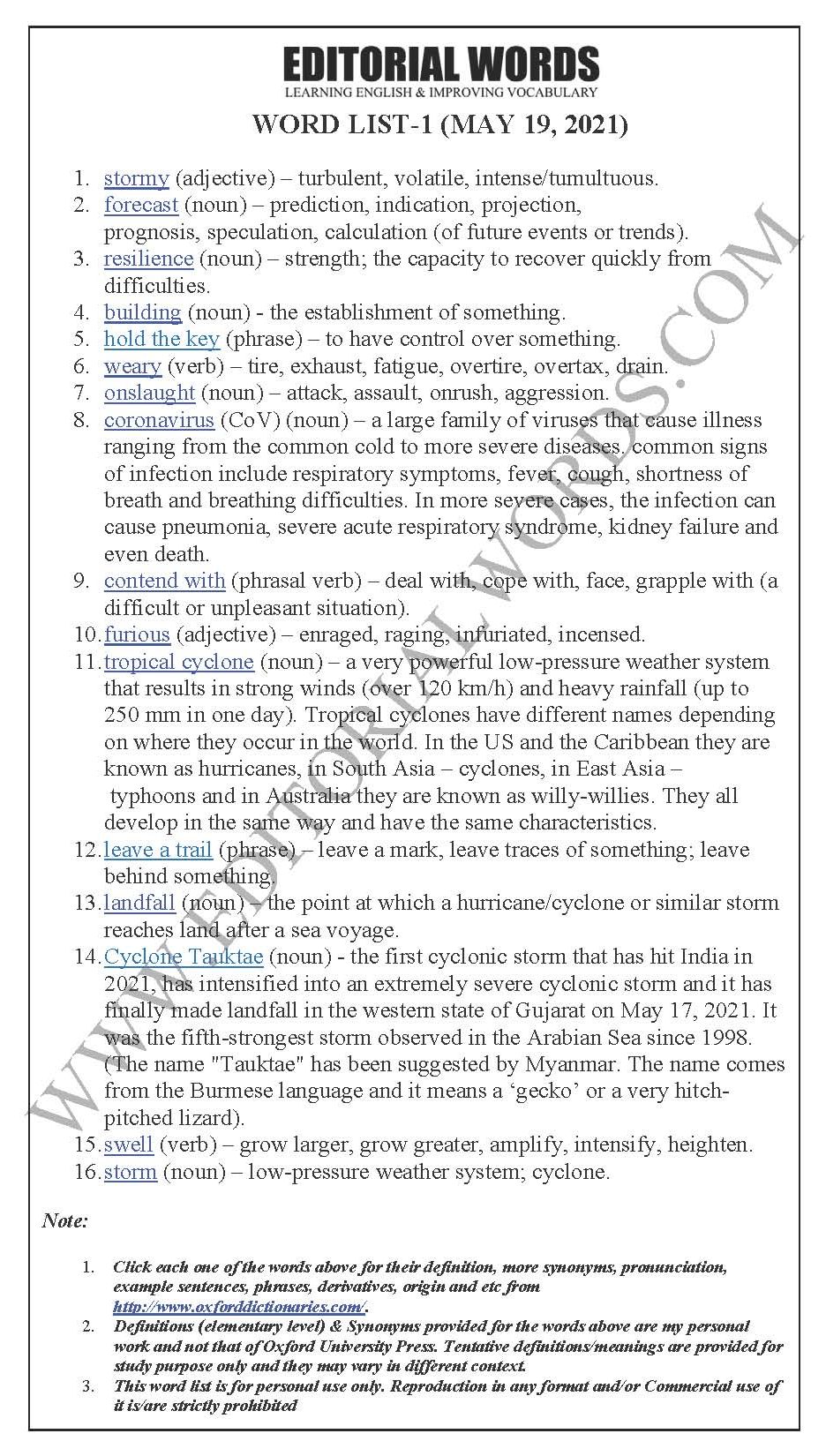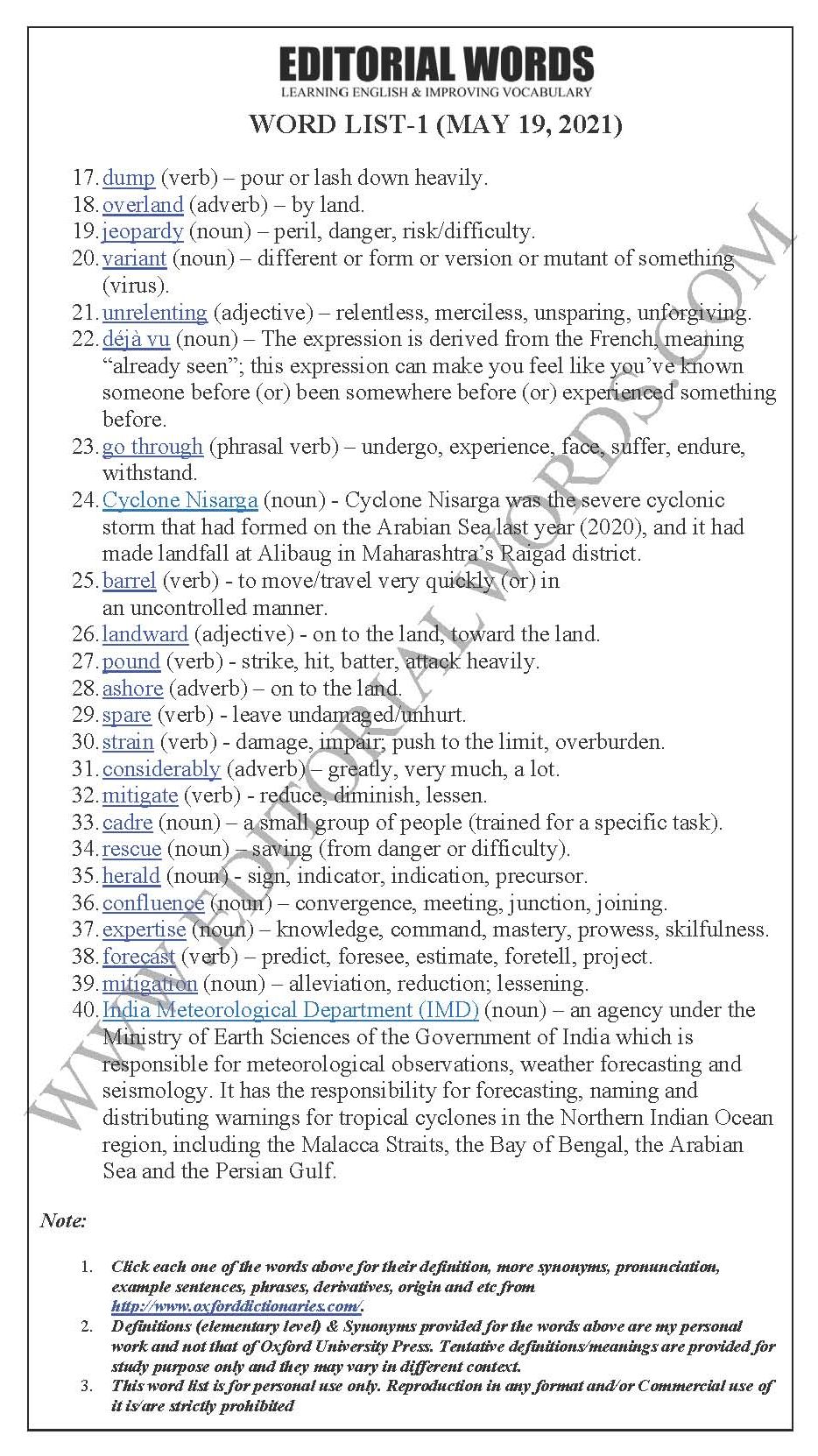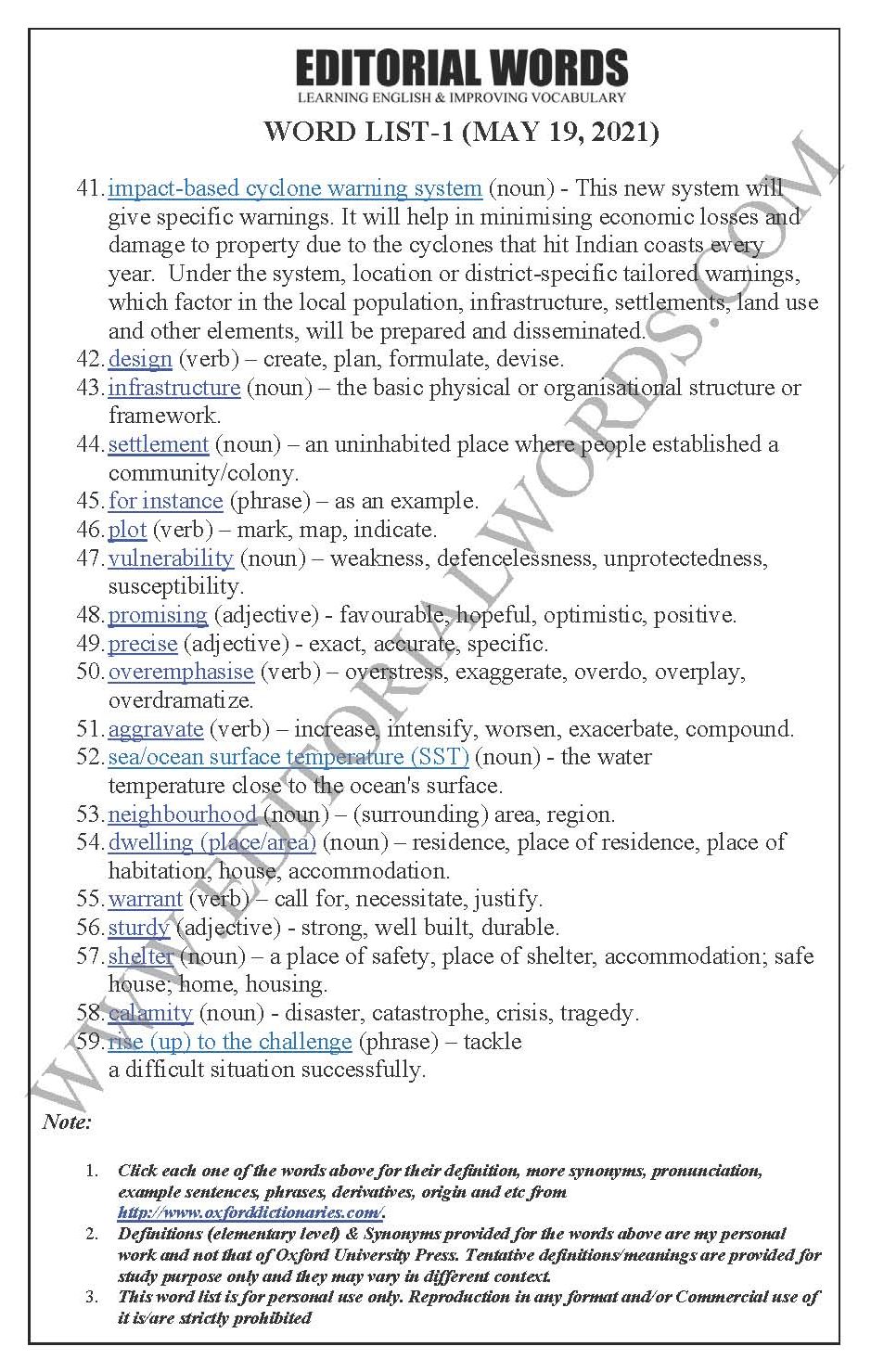The Hindu Editorial (Stormy start) – May 19, 2021
Millions of people wearied by the onslaught of the coronavirus have had to contend with a furious tropical cyclone that has left a trail of death and destruction before making landfall in Gujarat. For further reading, visit “The Hindu”. Below is today’s word list-1 for The Hindu Editorial (Stormy start) – May 19, 2021.
To read this article, click here.
This preview is provided here with permission.
Courtesy: The Hindu
The Hindu Editorial (Stormy start) – May 19, 2021:
- stormy (adjective) – turbulent, volatile, intense/tumultuous.
- forecast (noun) – prediction, indication, projection, prognosis, speculation, calculation (of future events or trends).
- resilience (noun) – strength; the capacity to recover quickly from difficulties.
- building (noun) – the establishment of something.
- hold the key (phrase) – to have control over something.
- weary (verb) – tire, exhaust, fatigue, overtire, overtax, drain.
- onslaught (noun) – attack, assault, onrush, aggression.
- coronavirus (CoV) (noun) – a large family of viruses that cause illness ranging from the common cold to more severe diseases. common signs of infection include respiratory symptoms, fever, cough, shortness of breath and breathing difficulties. In more severe cases, the infection can cause pneumonia, severe acute respiratory syndrome, kidney failure and even death. (Courtesy: WHO)
- contend with (phrasal verb) – deal with, cope with, face, grapple with (a difficult or unpleasant situation).
- furious (adjective) – enraged, raging, infuriated, incensed.
- tropical cyclone (noun) – a very powerful low-pressure weather system that results in strong winds (over 120 km/h) and heavy rainfall (up to 250 mm in one day). Tropical cyclones have different names depending on where they occur in the world. In the US and the Caribbean they are known as hurricanes, in South Asia – cyclones, in East Asia – typhoons and in Australia they are known as willy-willies. They all develop in the same way and have the same characteristics. (Courtesy: BBC)
- leave a trail (phrase) – leave a mark, leave traces of something; leave behind something.
- landfall (noun) – the point at which a hurricane/cyclone or similar storm reaches land after a sea voyage.
- Cyclone Tauktae (noun) – the first cyclonic storm that has hit India in 2021, has intensified into an extremely severe cyclonic storm and it has finally made landfall in the western state of Gujarat on May 17, 2021. It was the fifth-strongest storm observed in the Arabian Sea since 1998. (The name “Tauktae” has been suggested by Myanmar. The name comes from the Burmese language and it means a ‘gecko’ or a very hitch-pitched lizard).
- swell (verb) – grow larger, grow greater, amplify, intensify, heighten.
- storm (noun) – low-pressure weather system; cyclone.
- dump (verb) – pour or lash down heavily.
- overland (adverb) – by land.
- jeopardy (noun) – peril, danger, risk/difficulty.
- variant (noun) – different or form or version or mutant of something (virus).
- unrelenting (adjective) – relentless, merciless, unsparing, unforgiving.
- déjà vu (noun) – The expression is derived from the French, meaning “already seen”; this expression can make you feel like you’ve known someone before (or) been somewhere before (or) experienced something before.
- go through (phrasal verb) – undergo, experience, face, suffer, endure, withstand.
- Cyclone Nisarga (noun) – Cyclone Nisarga was the severe cyclonic storm that had formed on the Arabian Sea last year (2020), and it had made landfall at Alibaug in Maharashtra’s Raigad district.
- barrel (verb) – to move/travel very quickly (or) in an uncontrolled manner.
- landward (adjective) – on to the land, toward the land.
- pound (verb) – strike, hit, batter, attack heavily.
- ashore (adverb) – on to the land.
- spare (verb) – leave undamaged/unhurt.
- strain (verb) – damage, impair; push to the limit, overburden.
- considerably (adverb) – greatly, very much, a lot.
- mitigate (verb) – reduce, diminish, lessen.
- cadre (noun) – a small group of people (trained for a specific task).
- rescue (noun) – saving (from danger or difficulty).
- herald (noun) – sign, indicator, indication, precursor.
- confluence (noun) – convergence, meeting, junction, joining.
- expertise (noun) – knowledge, command, mastery, prowess, skilfulness.
- forecast (verb) – predict, foresee, estimate, foretell, project.
- mitigation (noun) – alleviation, reduction; lessening.
- India Meteorological Department (IMD) (noun) – an agency under the Ministry of Earth Sciences of the Government of India which is responsible for meteorological observations, weather forecasting and seismology. It has the responsibility for forecasting, naming and distributing warnings for tropical cyclones in the Northern Indian Ocean region, including the Malacca Straits, the Bay of Bengal, the Arabian Sea and the Persian Gulf.
- impact-based cyclone warning system (noun) – This new system will give specific warnings. It will help in minimising economic losses and damage to property due to the cyclones that hit Indian coasts every year. Under the system, location or district-specific tailored warnings, which factor in the local population, infrastructure, settlements, land use and other elements, will be prepared and disseminated.
- design (verb) – create, plan, formulate, devise.
- infrastructure (noun) – the basic physical or organisational structure or framework.
- settlement (noun) – an uninhabited place where people established a community/colony.
- for instance (phrase) – as an example.
- plot (verb) – mark, map, indicate.
- vulnerability (noun) – weakness, defencelessness, unprotectedness, susceptibility.
- promising (adjective) – favourable, hopeful, optimistic, positive.
- precise (adjective) – exact, accurate, specific.
- overemphasise (verb) – overstress, exaggerate, overdo, overplay, overdramatize.
- aggravate (verb) – increase, intensify, worsen, exacerbate, compound.
- sea/ocean surface temperature (SST) (noun) – the water temperature close to the ocean’s surface.
- neighbourhood (noun) – (surrounding) area, region.
- dwelling (place/area) (noun) – residence, place of residence, place of habitation, house, accommodation.
- warrant (verb) – call for, necessitate, justify.
- sturdy (adjective) – strong, well built, durable.
- shelter (noun) – a place of safety, place of shelter, accommodation; safe house; home, housing.
- calamity (noun) – disaster, catastrophe, crisis, tragedy.
- rise (up) to the challenge (phrase) – tackle a difficult situation successfully.
Note:
1. Click each one of the words above for their definition, more synonyms, pronunciation, example sentences, phrases, derivatives, origin and etc from http://www.oxforddictionaries.com/.
2. Definitions (elementary level) & Synonyms provided for the words above are my personal work and not that of Oxford University Press. Tentative definitions/meanings are provided for study purpose only and they may vary in a different context.
3. This word list is for personal use only. Reproduction in any format and/or Commercial use of it is/are strictly prohibited.
The Hindu Editorial (Stormy start) – May 19, 2021:



“Phrasal Verbs” We Learnt Last Week
“Idioms & Phrases” We Learnt Last Week
“Important Definitions” We Learnt Last Week
Recent Word Lists For The Hindu Editorial Articles

Be the first to comment